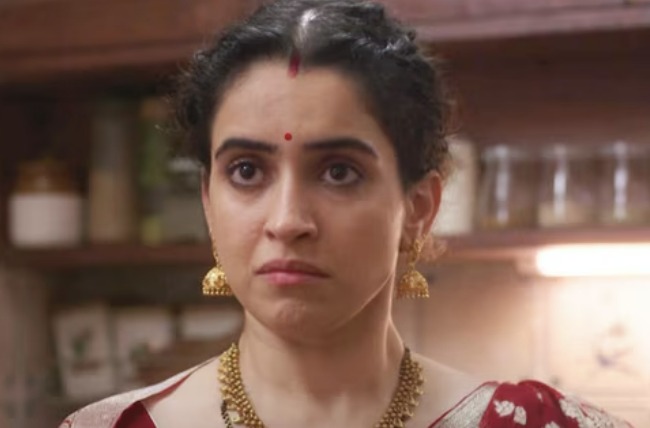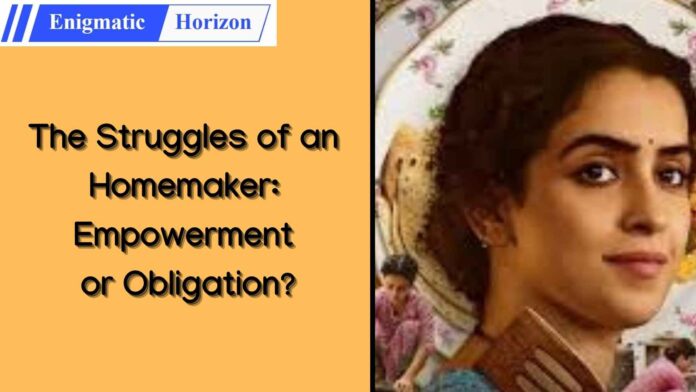(This is an analysis not a movie review)
“Mrs.” is a 2025 Hindi-language drama directed by Arati Kadav, featuring Sanya Malhotra in the lead role. The film is a Hindi adaptation of the acclaimed Malayalam movie “The Great Indian Kitchen” (2021). The movie is about the journey of Richa Sharma, a newlywed woman who is going through the challenges being a homemaker in a “patriarchal” home. The supporting cast includes Nishant Dahiya as her husband, Diwakar Kumar, and Kanwaljit Singh as her father-in-law, Ashwin Kumar. Released on ZEE5 on February 7, 2025, “Mrs.” has sparked a lot of heated debates and discussions on gender roles, societal expectations, and the portrayal of domestic life in India. Many people feel that such movies are quite problematic and can take society in a wrong direction.
The Unequal Recognition of Responsibilities
The role of a homemaker is a relentless, an often-invisible labor of love. It’s waking up before the sun rises, managing endless chores, nurturing children, and keeping a home running smoothly—all while rarely receiving the acknowledgment or respect it deserves. This work is the backbone of every family, yet it’s often taken for granted. This is something that we should appreciate the movie for highlighting! But the same time, while society is slowly waking up to the struggles of homemakers, there’s a deafening silence when it comes to the burdens shouldered by men.
For generations, men have been thrust into the role of the family’s financial provider, carrying the weight of expectations on their shoulders. The pressure to succeed, to provide, to be the “rock” of the family is immense. In many cultures, this isn’t just a societal norm—it’s legally enforced. Take India, for example, where personal laws mandate that, a husband must financially support his wife, even after separation or divorce, even if the break-up wasn’t his fault at all. Imagine the injustice of being legally bound to provide for a former spouse who chose to leave, even if you’ve moved on with your life.
Meanwhile, there’s no law requiring wives to cook, clean, or care for the home. These tasks are dictated by tradition and societal expectation, not legislation. And while men’s financial contributions are often met with indifference, the emotional and physical toll of their responsibilities is rarely acknowledged. Films like Mrs. does an impactful job of shedding light on the struggles of homemakers, but we should also never ignore the silent sacrifices made by men.
Homemaking is a Choice—Not a Compulsion
Today, women have more opportunities than ever before. Education, careers, entrepreneurship—the opportunities are at their fingertips. Laws like India’s Maternity Benefit Act and the POSH Act protect women’s rights in the workplace, ensuring they can thrive professionally. Flexible work arrangements, remote jobs, and supportive policies have made it easier for women to balance work and home life.

Unlike in the past, when societal norms boxed women into the role of homemakers, today’s women have the freedom to choose. They can pursue careers, start businesses, or opt to stay at home—it’s their decision. In Mrs., Richa Sharma’s journey as a homemaker is a choice she makes, not a fate forced upon her.
Society’s perception of gender roles is evolving, too. The idea that only women can be homemakers is changing, because we see men being homemakers as well. And the idea that a woman should always be a homemaker is fading, replaced by a growing emphasis on equality and shared responsibilities. Dual-income households can be seen becoming the norm, and families are encouraging their daughters to dream bigger.
Therefore, let’s be clear: homemaking, whether by a man or a woman, is a choice. It’s a role that deserves respect and appreciation, but it’s not an obligation. And while the lack of recognition for homemakers is a valid concern, we must also remember that no one is forcing anyone into this role!
The Biggest Problem with Mrs.: Not Promoting Understanding Over Toxicity
While Mrs. sheds light on the challenges faced by homemakers, at the same time the movie risks fueling division instead of creating a sense of understanding. We all know that cinema has the power to shape minds and hearts, but when films focus solely on conflict without offering solutions, they can deepen the ongoing “gender war” which is becoming a dangerous trend recently.
In a world where marriage rates are declining and divorces are on the rise, the portrayal of relationships in cinema and mass media matters more than ever. Young people are increasingly hesitant to marry, fearing the negative legal, financial and emotional impact of failed relationships. Films like Mrs., even though might be well-intentioned, can amplify these fears if they don’t strike a balance.
Divorce is sometimes necessary—especially in cases of abuse or huge differences—but it shouldn’t be portrayed as the only way out! Stories about marital struggles should also highlight the power of communication, mutual respect, and teamwork. Imagine a film where couples work through their differences, where both partners learn to appreciate each other’s contributions. That’s the kind of storytelling that can heal, not harm.
It’s also crucial to avoid vilifying one gender while uplifting another. Marriage is a partnership, and both men and women face unique pressures- it is not something limited to one gender. By portraying these challenges with empathy and nuance, films can encourage healthier relationships between men and women.
Conclusion: A Call for Balance and Empathy
Yes, Mrs. is more than a movie—it’s a conversation starter. It forces us to confront the inequalities embedded in our homes and societies. But as we celebrate its bold portrayal of a homemaker’s struggles, we must also not forget the sacrifices and hard work of men who provide for their families, carrying their own burdens.
True progress lies in mutual understanding. It’s about recognizing the value of both homemaking and financial provision and creating a world where both are respected equally. Films have the power to inspire change, but only if they tell stories that unite us, not divide us.
Let’s hope that as society evolves, so too will our stories—toward a future where love, respect, and shared responsibility are at the heart of every relationship.
